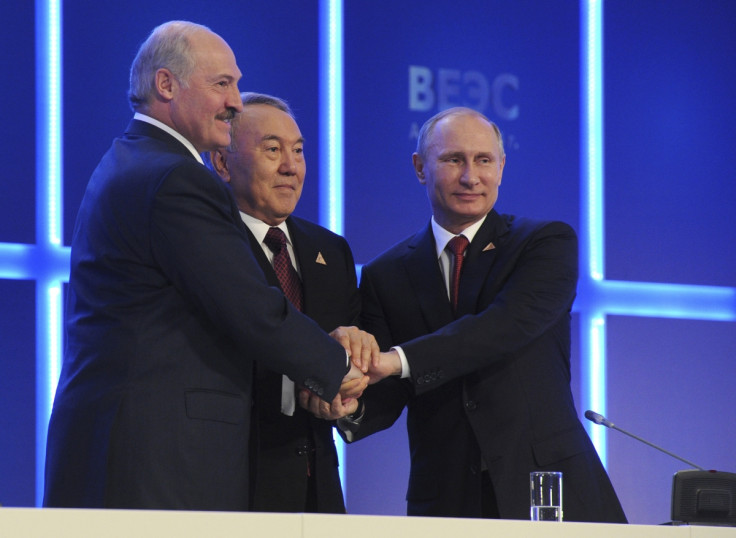How Russia's Eurasian Economic Union Impact Will Be 'Miniscule'

The leaders of Russia, Belarus and Kazakhstan have created the Eurasian Economic Union, an extension of the existing Customs Union.
The agreement, signed in Astana, is designed to boost trilateral trade, with Russian leader Vladimir Putin saying that Russia fully respects the sovereignty of the other two countries.
The union will remove trade tariffs between the three, align financial systems and market policies (such as agriculture, labour and transport) but there will be no single currency, nor will there be a common energy market.
Some 85% of import duties between the three are already harmonised, with the remainder earmarked to disappear by January 2015.
"The just-signed treaty is of epoch-making, historic importance," Putin said.
However, analysts have suggested that the economic impact will be minimal.
"I think any economic impact from this for Russia will be minuscule particularly in the short-term. The single market will only start operating in full from 2025 - by then a lot can change, but even in the long-term it's hard to see any substantial effects on Russia's economy," Liza Ermolenko, an analyst at Capital Economics told IBTimes UK.
It has been compared in some quarters to the European Union (EU), but in a recent report on the EEU, analysts pointed out the significant differences between the two.
"First, whereas the EU is mostly a union of middle-size and small countries, the Eurasian Union is much less balanced in its composition. Russia's dominance of the customs union is overwhelming, accounting for 86% of the bloc's GDP and 84% of its population.
"The same figures for Kazakhstan and Belarus are 8% and 10% and 5% and 5% respectively," wrote Iana Dreyer and Nicu Popescu of the European Union Institute for Security Studies.
Accelerated discussions
Negotiations around the EEU have been ongoing for some time, but took on new prominence this year, as Russia attempted to reassert its influence among the former Soviet states in the wake of the Ukraine crisis.
"It does seem to be more of a political step, particularly coming so soon after the China deal. Russian officials are keen to prove to the rest of the world that the country is not economically isolated as the west has claimed," Ermoklenko said.
In Kazakhstan, there have been anti-government and anti-Russian protests since the situation in Ukraine flared up. The acceleration of the EEU could be viewed as an attempt by all involved to restore some regional stability
Of all the former Soviet states, Belarus and Kazakhstan are Russia's largest trading partners, with only the EU and China having more bilateral trade with Russia.
Energy-rich Kazakhstan is by a distance the largest economy in the sphere, besides Russia. It has more oil than both the US and China and strongman president Nursultan Nazarbayev has historically been able to play China, Russia and the US off one another with some degree of success.
He has invited billions in foreign direct investment into vast oilfields in the country, with all the western oil majors partnering with CNOC of China on the giant Kashagan oil project – which has over the years secured some $50bn (£30bn, €37bn) in international finance.
For Putin, then, sealing a deal with the belligerent Nazarbayev may be seen as something of a coup.
Europe's Last Dictator
With Belarus, however, it was never in doubt.
The country has been billed as "Europe's last dictatorship" by the west and Alexander Lukashenko, the tyrant leader, is keen to play up to the label.
"Better to be a dictator than gay," was his response to homosexual German foreign minister Guido Westerwelle, who criticised his autocratic rule.
The country has resisted any efforts to reform from the west, aligning itself closely with Moscow since independence in 1991.
Belarus is heavily dependent on Russian energy subsidies and also relies on Russian purchases of its heavy machinery and rolling stock.
During the Soviet era, the country was hub for industrial and agricultural equipment and its lack of reform in the intervening years means that these are still its primary exports.
Russia has been increasing its financial influence on Kazakhstan's neighbouring states of late. Gazprom has taken controlling stakes in Kyrgyzgas in Kyrgyzstan with hydroelectric company RusHydro and energy company Inter RAO spending billions on power generation in the country.
Kyrgyzstan previously stated its desire to join the Customs Union and may be expected to follow Belarus and Kazakhstan into the EEU. Armenia was also expected to join, but fears over political autonomy may mean that both face domestic opposition to accession.
According to Popescu, "several studies on the countries of the former Soviet Union have shown that they have more to gain by integrating with the outside world than with each other".
© Copyright IBTimes 2025. All rights reserved.






















